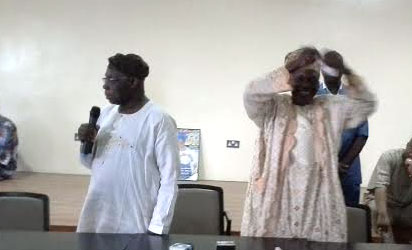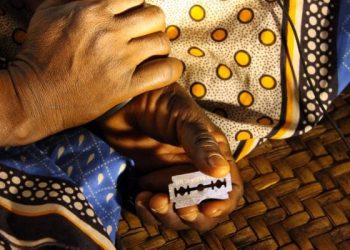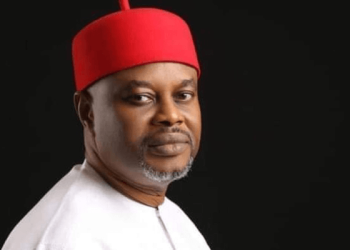Ex-President Olusegun Obasanjo took the nation by storm on Monday, February 16, when he dumped his party of 16 years, the Peoples Democratic Party (PDP), with a dramatic tearing up of his party membership card. His spectacular parting of ways with the PDP to take on the role of a statesman, as he put, has been generating ripples in the polity. The former president apparently took advantage of a visit by his PDP ward members ostensibly to plead with him to tone down his criticism of President Goodluck Jonathan who is the candidate of the PDP in next month’s presidential election, to show his utter disenchantment with the party. He ordered his ward chairman, Usman Oladunjoye, to tear his membership card to shreds in full public glare and before television cameras.
Until then, Obasanjo had used every opportunity to affirm his membership of the ruling party, saying that he remained a very active member at his ward level. He has, for some years now, engaged in running battles with President Jonathan, culminating in his resignation as chairman of PDP’s Board of Trustees in 2013, and now a total withdrawal of his membership. Obasanjo’s unrelenting castigation of the ruling party and Jonathan’s government has been a constant headache to the leadership of the PDP. He has criticized the government in open letters, interviews and also in his latest book, My Watch. In all, the former president insists that he reserves the right to air his opinions on the state of the nation, as Nigeria remains his primary concern.
No one can deny the two-time former leader of Nigeria the right to hold personal opinions. In fact, the 1999 Constitution in Section 40 guarantees the right to form or belong to any association or party and the right to exit same whenever one chooses. So, his decision to dump the PDP is well within his rights.
What has, however, drawn consternation in the polity is his manner of exit from the ruling party. Did Obasanjo need that early Monday morning drama to announce his exit from the PDP? We do not think so. For us, his handling of his exit from the party was quite unbecoming of one who intends to take on the role of a statesman. It is conduct that ought not to be displayed by one who has held the high office of president of the Federal Republic of Nigeria and we are unequivocal in adding our voice to those of other well meaning Nigerians who have condemned the action. Nigeria will be better off without inciting actions such as this, especially in this season of great national challenges.
Whatever the grievances of the ex-president, and there may be many, we think he ought to have exercised greater restraint and demonstrated better public decorum and statesmanship. To have succumbed to such public demonstration of anger and frustration is, to say the least, antithetical to the very spirit of statesmanship that he seeks.
As Obasanjo exits PDP, we enjoin him to be more circumspect in his actions and carefully weigh their possible impact before carrying them out. His instigation of the public destruction of his PDP card is a great disservice to his aspiration to be a statesman. Globally, statesmen are known for their discretion and great acts of service to their countries that are worthy of emulation, and not avoidable controversies. Certainly, the public derision of the ruling party last Monday by a supposed high ranking member of the party is not worthy of emulation by anyone.
Obasanjo’s public show of his decision to dump the PDP is, however, yet another indication of the galling lack of internal democracy in some of the country’s political parties. That a former two-term president and one-time Chairman of PDP’s Board of Trustees felt constrained to demonstrate his frustrations in such a vehement manner says a lot about the state of our parties. The former President had hinted sufficiently in his letters that he had to resort to the open and less dignifying medium of communicating with the president because of the frequent denial of agreements reached with the presidency.
Obasanjo’s larger-than-life image in the PDP is undoubtedly a result of his adoption of the title of “Leader of the Party” during his Presidency. This has unfortunately become the norm in the party, to its detriment.
Going forward, therefore, we caution political parties to allow for the full expression of internal democracy, while their aggrieved members exercise utmost restraint, so as not to heat up the polity. Parties are institutions, not private estates, and whatever actions are taken by all stakeholders should be in the best interest of the members and the country at large.
This is what all of the present political actors should bear in mind as they play their politics. They must not obfuscate issues. In any case, how can Obasanjo extricate himself from responsibility for Jonathan’s performance in office, whether good or bad, considering the role he played in his ascendancy to the office of president?Now that he has left the PDP, we advise the former president to properly play the role of a statesman that he has chosen to take up and eschew inflammatory language and conduct.
Politicians should realise that incendiary language and conduct are forms of verbal violence that can instigate physical violence in the country.
Ultimately, ordinary Nigerians will be the losers if violence breaks out. We cannot afford any conduct that can lead to an escalation of tension and violence in the polity.












































